In my time as a teacher, I have had the privilege of integrating edtech into my curriculum and, consequently, the opportunity to witness its transformative potential. My insights extend beyond the classroom, though. As an edtech blogger, I’ve been able to share my expertise with a wider audience and stay updated on the latest tech advancements that could benefit both students and educators.
Furthermore, my journey of earning a Ph.D. has given me a firsthand experience of the college student’s life, including their needs, challenges, and how the right tools can make a difference.
During those years, I tried out and tested various laptops – some while juggling intense coursework, others while executing comprehensive research. This comprehensive interaction with numerous brands and models puts me in a unique position to guide you in your quest for the perfect laptop.
[Related: Best Laptops for Teachers]
This post, therefore, isn’t just from an educator, blogger, or Ph.D. graduate perspective, but from someone who has been in the trenches, understanding the practical needs of both teaching and learning.
I bring you this guide on the best laptops for college students, assuring that each recommended product is based on hands-on experience, extensive research, and a keen understanding of what you really need to succeed in your academic journey.
Best Laptops for college students
Here are my top picks for the best laptops for college students, scroll down for full reviews.
Our pick
Featured Alternatives
Check out today’s deals for Laptops
1. ASUS Zenbook
ASUS Zenbook is a laptop that stands out for its potent combination of high performance, seamless multitasking, and immersive display.
Why did I select the ASUS Zenbook? Simply put, this laptop hits the sweet spot of power and portability. It sports a 12th Gen Intel Core i5 processor that ensures quick and smooth operation, even when running demanding applications. Paired with 8GB RAM and a 1TB SSD, it offers ample storage and swift response times, making it perfect for everything from writing term papers to video editing projects.
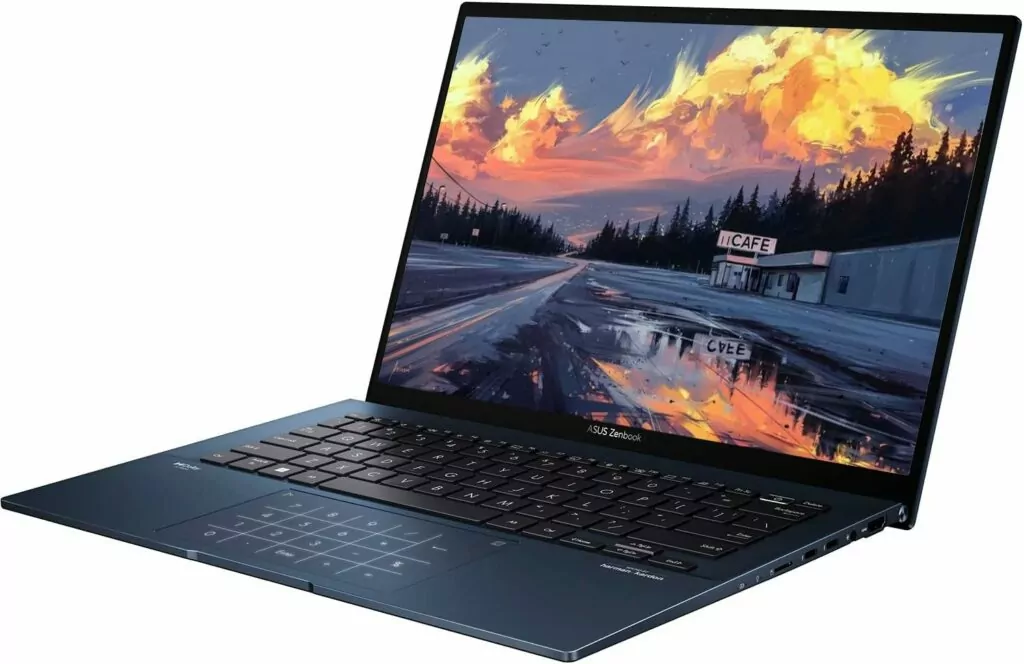
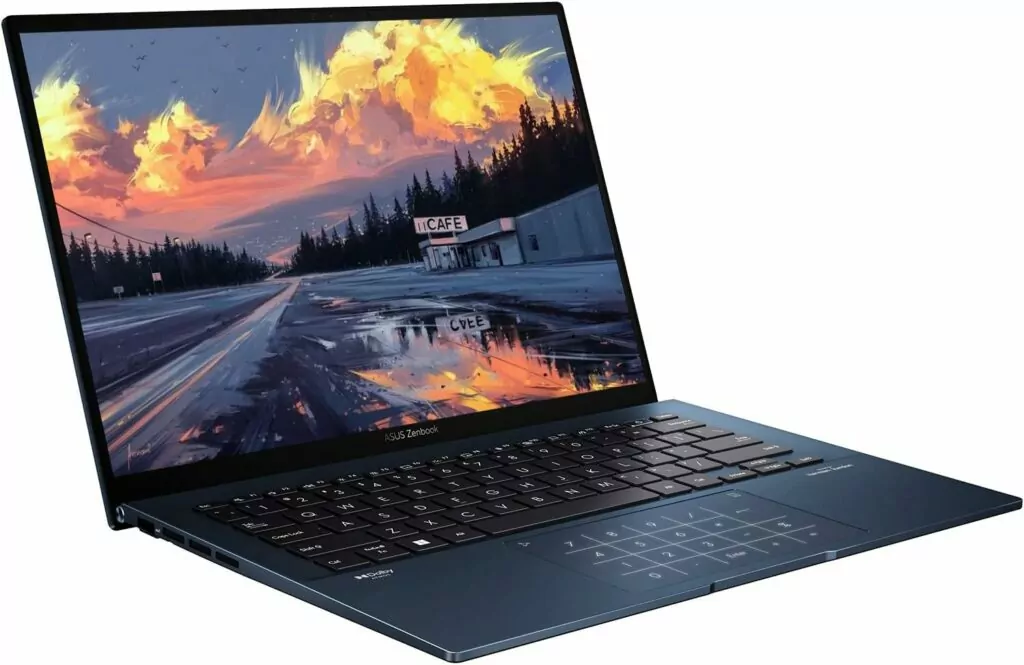
Features:
- 12th Gen Intel Core i5-1240P 3.30GHz 12-Core Processor
- 8GB DDR4 SDRAM and 1TB PCIe NVMe M.2 Solid State Drive
- 14″ 2.8K (2880x 1800) 90Hz 100% DCI-P3 color gamut OLED NanoEdge display
- Wifi-6 and Bluetooth connectivity
- Windows 11 Home 64-bit operating system
- 720P Camera and Dual Array Microphones
- MicroSD media card reader
- Multiple ports including 1 x USB 3.2 Type A Ports, 1 x HDMI 2.0, 2 x USB Type C Thunderbolt 4 Ports, 1 x Headphone/Mic Combo Jack
- Up to 18 Hours of battery life
- Lightweight and compact design (3.06 lbs and 0.67 inches thick)
Pros
- Powerful 12th Gen Intel Core i5 processor ensures seamless multitasking
- Generous 1TB SSD storage provides ample space for documents, photos, and videos
- High-resolution 2.8K OLED NanoEdge display delivers vibrant, detailed visuals
- Remarkable 18-hour battery life supports all-day use
- Lightweight and portable design for easy mobility
Cons
- Limited RAM (8GB) might not be ideal for more intensive tasks.
- Some users may prefer a larger display than the 14″ offered.
- No optical drive included
- Higher-end pricing may not suit all student budgets
2. HP Spectre
Continuing our exploration of the best laptops for college students, we’re spotlighting the HP Spectre. This model is an impressive contender that excels in power, aesthetics, and security. As an educator and tech enthusiast, I’ve tested various laptops and can vouch for the HP Spectre’s seamless performance and stunning design, making it an ideal choice for students.
Why the HP Spectre? It’s equipped with a 12th Generation Intel Core i7 processor with 10 cores that guarantees a swift, responsive, and efficient computing experience. Coupled with a whopping 32GB of RAM and a 1TB SSD, it’s an exceptional pick for students who need to manage heavy workloads. Add to that the 13.5″ WUXGA touchscreen and the HP Zenvo Tilt pen for a more interactive, productivity-enhancing experience.
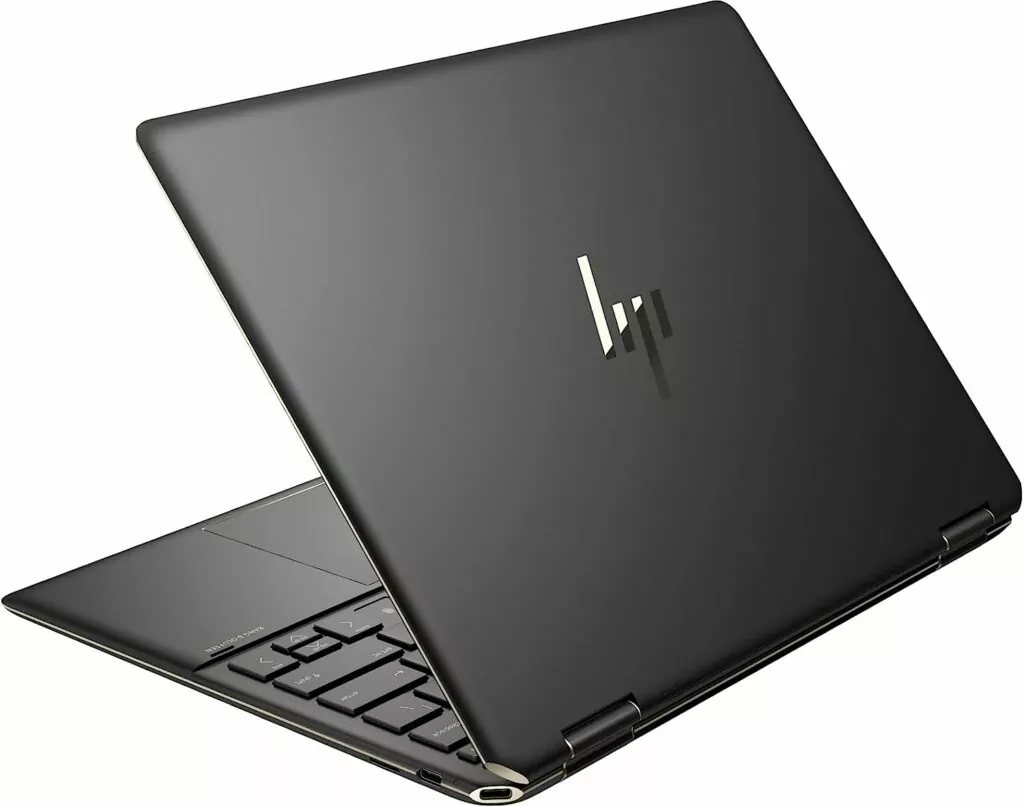
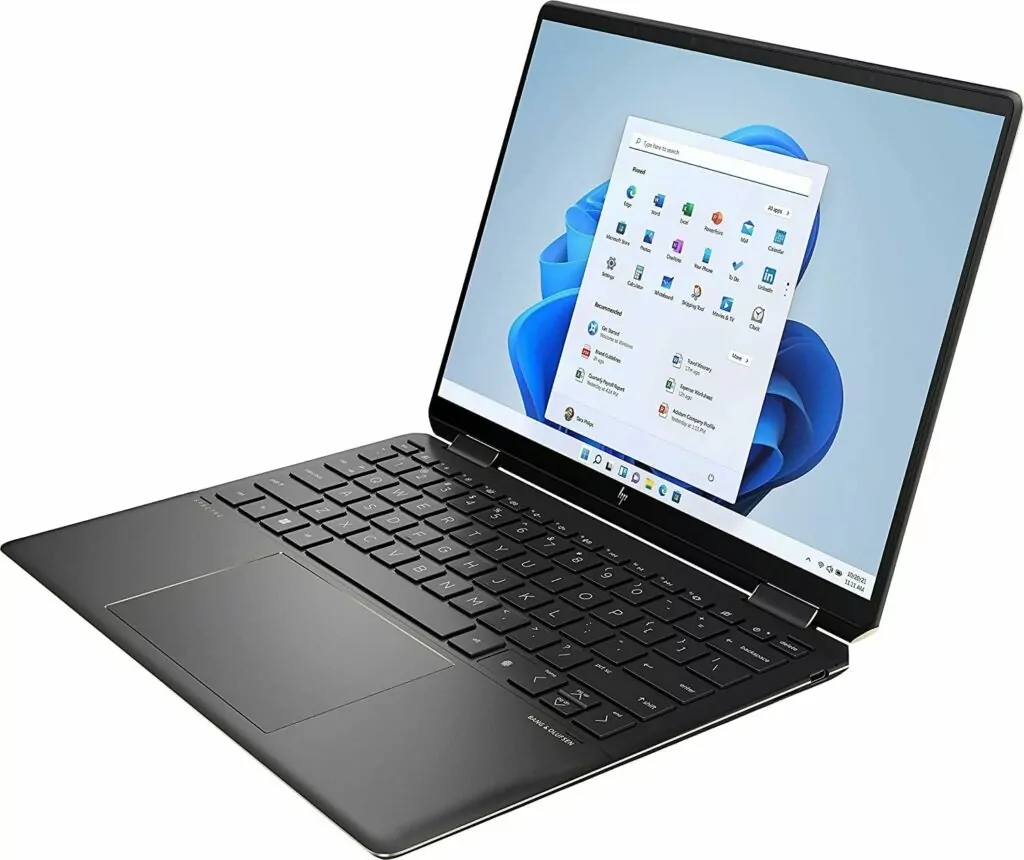
Features:
- 12th Generation Intel Core i7-1255U processor with up to 4.7 GHz
- 32GB DDR4 SDRAM and 1TB NVMe (4×4 SSD) Solid State Drive
- 13.5″ WUXGA Touchscreen display with a 3:2 aspect ratio
- Windows 11 Pro 64-bit pre-installed
- Bang & Olufsen speakers with HP Quad Speakers and HP Audio Boost
- HP Wide Vision HD Webcam with Dual Digital Microphone
- Multiple ports, including 2 x Thunderbolt 4 with USB4 Type-C and 1 x SuperSpeed USB Type-A
- Up to 12 hours of battery life
- Lightweight design (3.01 lbs)
Pros
- Powerful 12th Gen Intel Core i7 processor ensures seamless multitasking
- Generous 32GB RAM is perfect for multitasking and demanding applications
- Impressive 1TB SSD storage provides ample space for documents, photos, and videos
- High-resolution WUXGA touchscreen enhances productivity and offers a more immersive viewing experience
- Bang & Olufsen speakers deliver premium sound
- Comes with HP’s Zenvo Tilt Pen for enhanced precision and interaction
Cons
- Higher-end pricing may not suit all student budgets
- Some users may prefer a larger display than the 13.5″ offered
- Does not have an optical drive
3. HP Stream Laptop
Next up on our list is the HP Stream Laptop. This model is ideal for students looking for a lightweight, nimble laptop that can seamlessly transition between work and play. With its long battery life and powerful Wi-Fi antenna, it prioritizes productivity without slowing down your pace.
The HP Stream Laptop is an eye-catching choice for students on the go. With its vibrant color and lightweight design, it adds personality while being portable enough for everyday carry. One of the laptop’s standout features is its integrated suite of Microsoft Office applications — including Excel, Word, PowerPoint, OneNote, and Access — plus 1 TB of OneDrive storage for a year. This package significantly boosts your productivity and streamlines your assignments.
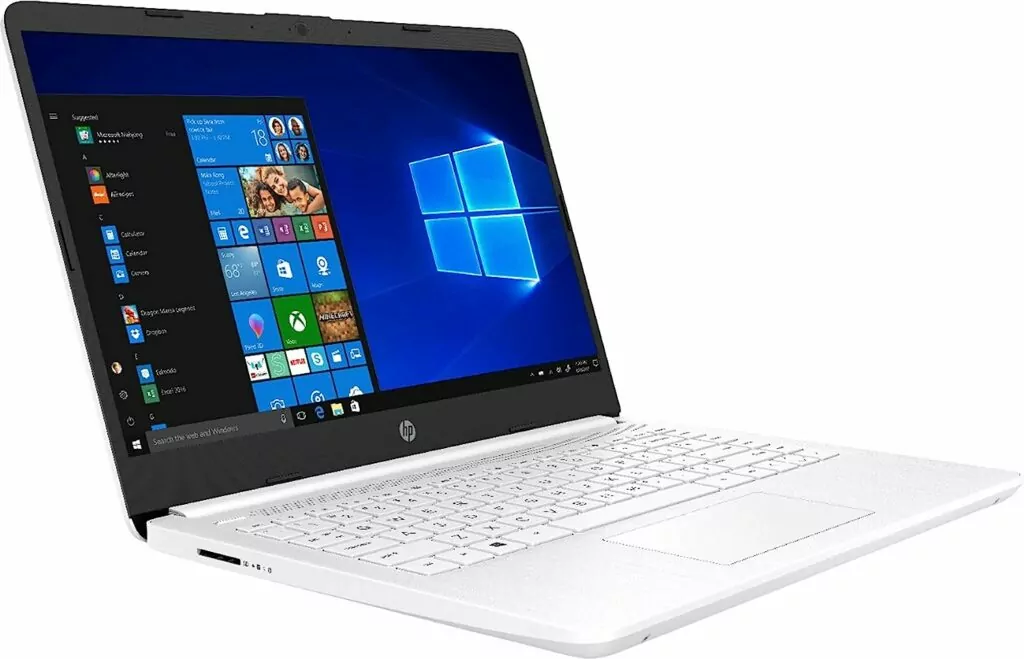
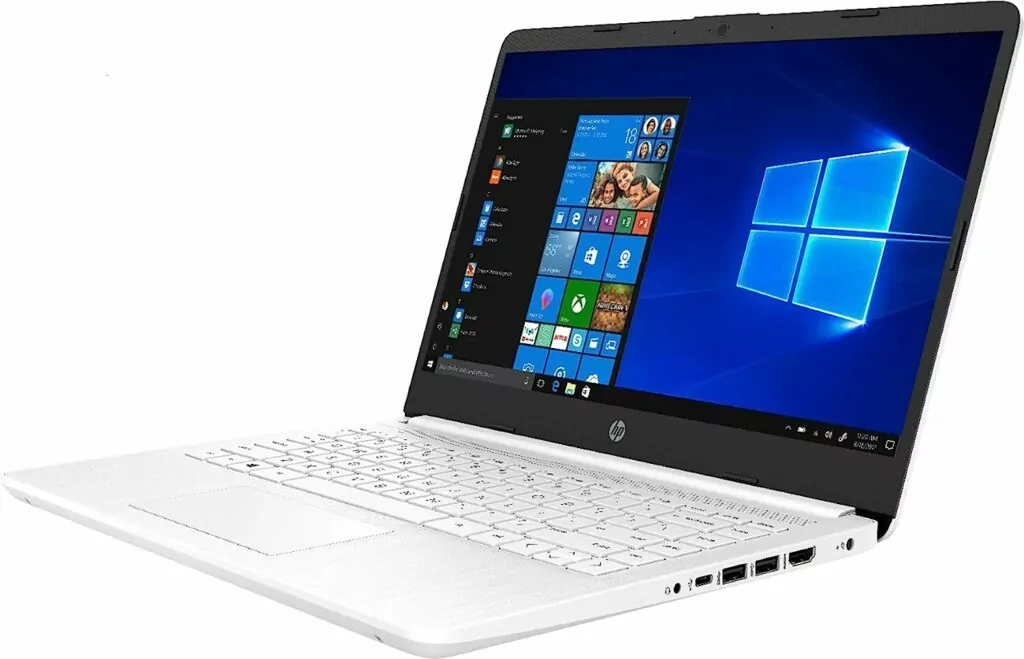
Features:
- Slim and lightweight design for portability
- Full access to Microsoft Office suite and 1 TB of OneDrive Storage for one year
- Improved 802.11 ac 2×2 Wi-Fi antenna for a reliable internet connection
- Over 10 hours of battery life
- Windows 10 Home operating system
- Vibrant Royal Blue color for a personal touch
Pros
- Lightweight and portable, making it great for students on the go
- Comes with a suite of Microsoft Office applications and 1 TB of OneDrive storage, boosting productivity
- Long battery life of over 10 hours is excellent for all-day use
- The strong Wi-Fi antenna ensures a reliable internet connection
- The vibrant Royal Blue color adds a unique touch
Cons
- Not ideal for heavy multitasking or resource-intensive tasks
- Does not specify the amount of RAM and processor specifications
- The storage type and size are not specified, which might limit the amount of data it can hold
- Does not have an optical drive
4. The ASUS VivoBook
The ASUS VivoBook is a sleek, light, and user-friendly laptop. Its lightweight design and efficient battery life make it a fantastic choice for users who need to carry their work with them wherever they go. The laptop comes with a robust Intel Celeron N4500 Processor, providing solid performance for day-to-day tasks.
This VivoBook offers 4GB of high-bandwidth RAM and a 256GB PCIe NVMe M.2 Solid State Drive. This combination ensures smooth multitasking and rapid data transfer. The inclusion of a 64GB eMMC startup disk ensures a fast boot-up experience, getting you to work sooner.
The 14-inch HD anti-glare touch screen with energy-efficient LED backlight enhances your viewing experience while reducing eye strain. It runs on Windows 11 Home in S Mode, which you can switch to regular Windows 11 if you prefer.
For productivity, this laptop also comes with a one-year subscription to Microsoft Office 365. This suite includes Microsoft Excel, Word, PowerPoint, OneNote, Access, and 1 TB of OneDrive storage.
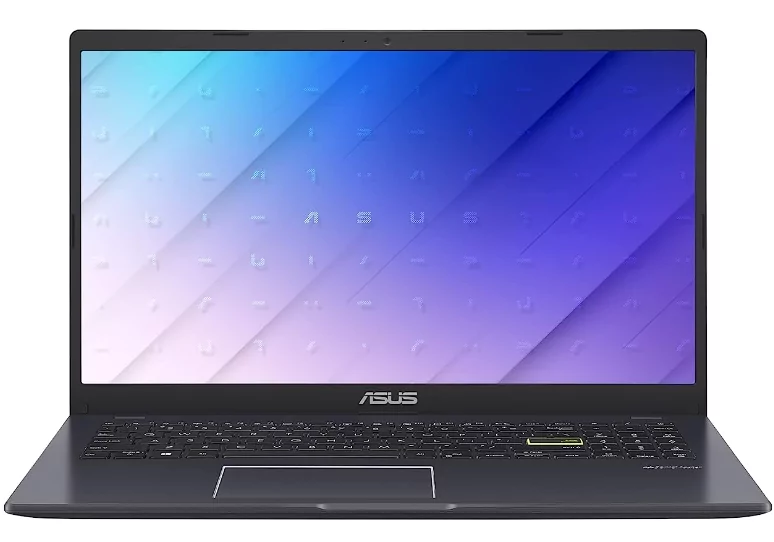
Features:
- Intel Celeron N4500 Processor with a base clock speed of 1.1 GHz (up to 2.8 GHz with Turbo Boost, 4M Cache, 2 cores)
- 4GB DDR4 SDRAM
- 256GB PCIe NVMe M.2 Solid State Drive
- 14″ HD (1366×768) Anti-glare Touch Screen
- Ports: 1 x USB 3.2 Type-C (Gen1), 1 x USB 3.2 Type-A (Gen1), 1 x USB 2.0, 1 x Micro SD card reader, 1 x HDMI 1.4b, 1 x Headphone/microphone combo jack (3.5mm)
- Wi-Fi 5(802.11ac) + Bluetooth 4.2
- Stereo speakers (1.5W x2) with Dolby Audio
- Built-in HD Webcam (720p)
- Up to 9.5 hours of battery life
- Windows 11 Home operating system (S Mode)
Pros
- Lightweight and compact design for easy portability
- Comes with a year’s subscription to Microsoft Office 365
- Multiple connectivity options with USB-C, USB-A, HDMI, and SD card reader ports
- Touch screen display for added convenience and ease of use
- SSD storage for faster boot-up and data transfer speeds
Cons
- The resolution of the display might be considered low by some users
- The Intel Celeron N4500 Processor might not be powerful enough for intensive tasks
- The 4GB RAM may not be sufficient for heavy multitasking
Frequently Asked Questions (FAQs)
What features should I look for when buying a laptop for college?
When buying a laptop for college, consider factors like portability, battery life, performance, and storage. A lightweight laptop is easier to carry around. A long battery life is beneficial as you might be away from a power source for extended periods. An efficient processor, ample RAM, and enough storage (preferably SSD) are needed for multitasking and storing all your files.
Do I need a high-end laptop for college?
The type of laptop you need depends on your course requirements. For most general coursework, a mid-range laptop should be sufficient. However, if your coursework involves graphic design, video editing, or other demanding tasks, you might need a more powerful laptop.
Should I get a laptop with a dedicated graphics card?
A dedicated graphics card is not necessary unless you’re involved in gaming, video editing, graphic design, or any task that involves intense graphical calculations. For general tasks like note-taking, research, and writing papers, the integrated graphics in most laptops should be sufficient.
Is a touch screen necessary?
A touch screen is not a necessity, but it can be a useful feature, especially for creative tasks. It generally comes down to personal preference.
How much storage do I need?
Storage needs depend on the kind of work you’ll be doing. For most students, a 256GB or 512GB SSD should be enough. If you work with large files or like to have movies and games on your laptop, consider getting more storage.
What operating system is best for college students?
The choice of operating system depends largely on your personal preference and your course requirements. Windows is generally a safe bet as it’s widely used and compatible with most software. Mac OS is popular in creative industries, while Linux is preferred by computer science students due to its open-source nature.
Do I need a laptop with a lot of RAM?
RAM is important for multitasking. The more RAM your laptop has, the more applications or tabs you can have open at once without your laptop slowing down. For most students, 8GB of RAM is sufficient. If you’re into heavy multitasking or run demanding software, consider getting 16GB or more.
Should I consider the laptop’s warranty?
Yes, a warranty can save you a lot of trouble and money if your laptop breaks down. Always check the warranty period and what it covers before purchasing.
Is it worth buying a laptop with a smaller SSD and then upgrading it later?
While it’s possible to buy a laptop with a smaller SSD and then upgrade it later, it’s often more cost-effective and less hassle to buy a laptop with the amount of storage you think you’ll need from the start. Plus, not all laptops allow easy upgrading of components.




